
by Nandini Archer and Marge Berer
For International Safe Abortion Day this year, we are celebrating the many aspects of progress and success we’ve seen internationally this year. Here is a timeline with 28 examples.


This year marks the 29th time our movement has celebrated 28 September as an international day for safe abortion. It has been a busy year for abortion rights campaigning, and a good one in many countries. Much of the mainstream media reported on the Irish abortion referendum and the almost successful Argentinian law reform, but action has also been taking place all over the world, inside and outside government, on the streets and in the media, from South Korea to Mexico to the Democratic Republic of Congo. In focusing on the increasingly organised and sometimes violent backlash against women’s rights globally, and the myriad challenges we still face, we sometimes lose sight of the many positive strides forward. This newsletter celebrates them, and all the people who have worked tirelessly to make them possible. We hope they help to energise us all.
- El Salvador commutes two women’s prison sentences
On 15 February, Teodora del Carmen Vásquez regained her freedom after serving 11 years for aggravated homicide, when in fact she had had a stillbirth. The Supreme Court of Justice and the Ministry of Justice and Public Security commuted her sentence, they said, because: “There are powerful reasons of justice, equity and law in nature that justify it.” In a similar case one month later, Maira Verónica Figueroa Marroquín was released after her 30-year sentence for homicide was commuted. “I am happy to be with my family,” she said. “I want to study law to understand what happened to me and help other women. I’m going to start again and make up for lost time.”
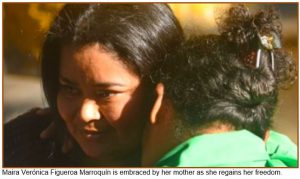
- New Zealand’s PM announces her intention to reform the law
On 16 February, Prime Minister Jacinda Ardern announced her decision to launch a reform of New Zealand’s abortion law. New Zealand’s current law permits abortion where the woman faces danger to her life, physical or mental health, or in cases of fetal anomaly. Written three years before medical abortion came on the scene, it assumes abortions will be surgical. The Abortion Law Reform Association has called for all restrictive grounds on abortion to be abolished.
- Macedonia announces its intention to reform the law: On 8 March, the recently appointed Health Minister of Macedonia, Venko Filipce, announced that he would start working to amend the abortion law to protect women’s health. The current 2013 law is extremely restrictive and sparked widespread criticism from women’s and human rights activists when it was adopted.
- Democratic Republic of Congo publishes the Maputo Protocol in its legal gazette
Article 14 of the Protocol requires signatory states to protect women’s reproductive rights, including legal access to abortion. The country’s constitution states that international treaties ratified by the government shall supersede national laws once those treaties are published in the legal gazette. A coalition of national and local NGOs promoted this action and is now working with government to raise awareness of this legal change so as to ensure women’s access to safe abortion.
- Chilean feminists defend their new abortion law
On 26 and 28 March, feminists mobilised in Santiago to protect their new abortion law. In 2017, the right to abortion on three grounds was won in Chile, and although the new conservative government sought to restrict the law, they have so far been unsuccessful. In August, opposition MPs presented a bill in congress seeking to further legalise abortion, inspired by Argentina. While it may have little or no chance of success in the short run, the idea is to keep open the discussion and aim for a better law.
- Cyprus reforms its abortion law
On 30 March, after years of discussion and three years of inaction on a bill that was tabled in 2015, the parliament of Cyprus reformed its law to allow broader legal grounds for abortion. The new law allows abortion up to 12 weeks of pregnancy without having to prove a risk to the woman’s health and up to 19 weeks in case of rape. The vote in support of the bill was 33 in favour, 8 against and 5 abstentions.
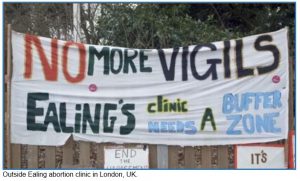
- Canadian provinces and a local council in London, UK, establish abortion clinic buffer zones
On 10 April, Ealing Council in west London unanimously voted to implement a 100m buffer zone around the Marie Stopes abortion clinic to stop harassment of women and staff entering and leaving the clinic. More than 300 people wrote to the council describing the anti-abortion protesters as “intimidating and harassing”. In August 2018, the clinic received a death threat from one protester, which was reported to the police. In spite of this, in September the Home Secretary refused to make the buffer zones national.
On 31 May, the Alberta New Democratic Party passed a law to create no-go zones around Alberta’s abortion clinics. Alberta joined British Columbia, Ontario, Quebec, Newfoundland and Labrador to stop protesters from harassing patients and protect staff entering and leaving clinics.
- French Equality Council proposes contraception and abortion should be a constitutional right
On 19 April, the French High Council for Equality Between Women and Men published a call for the modernisation of the Constitution of the French Republic to include the constitutional right to contraception and abortion, as a crucial way to guarantee gender equality.
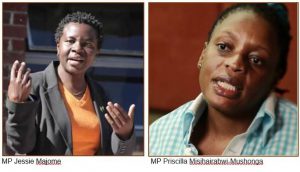
- Speaking out in Zimbabwe for abortion law reform
On 9 May, there were fresh calls for Zimbabwe’s abortion law to be reformed, as Bernard Madzima, head of Family Health in the Health Ministry, highlighted that a large number of teenage girls are dying from backstreet abortions, while a doctor who provides illegal abortions said that parents approach him all the time to help their daughters. Meanwhile, Priscilla Misihairabwi-Mushonga, who heads the Parliamentary Committee on Gender and Youth Affairs, toured the country to collect views on abortion, which will be presented to Parliament as part of the reform process and MP Jessie Majome argued that although abortion on grounds of rape is legal, the red tape women have to go through makes it impossible.
- Mexico Supreme Court confirms right to abortion in two rape cases
On 15 and 18 May, Supreme Court judgments in two cases ruled that it was a violation of the reproductive rights of the women concerned not to have been able to have an abortion. Both women had been raped and became pregnant, but were denied abortions, even though abortion on the ground of rape is legal in Mexico. The two women had to wait years for their appeals to be heard.
- Ireland votes to repeal the 8th Amendment of 1983
On 25 May, Irish women won in Ireland, as the country voted to repeal the 8th Amendment to the Constitution of 1983, which had given a fetus equal rights to those of the pregnant woman. The final vote YES was a two-thirds majority for repeal, passed in all but one of the country’s 40 local constituencies.
- Action in Northern Ireland sparked by Irish referendum
The most immediate response to the referendum result was a call-out from many quarters for Northern Ireland to be next, in spite of the complex political realities in the way. The Northern Ireland Regional Director of the Royal College of Midwives said that no one was speaking up for the pro-choice majority in Northern Ireland. Unite, one of the largest trade unions in Ireland, also supported a change in the law. In response to a call for the Westminster Parliament to amend the British law to include Northern Ireland, some 160 British MPs expressed their support. At the same time, the Irish Prime Minister said he couldn’t see why women from Northern Ireland wouldn’t be able to have abortions in the Republic, once the new law was in place there.

- A motion tabled in Jamaica calls for debate on abortion law reform
A group of experts on human rights in patient care attending the Jamaica Observer Monday Exchange on 10 April, in anticipation of the International Day for Maternal Health and Rights on 11 April, urged legislators to repeal sections of the 1864 Offences Against the Person Act which prevent Jamaican women from legally terminating pregnancies. On 5 June, Julia Cuthbert-Flynn tabled a motion in the Jamaican Parliament calling for a debate on the law that criminalises abortion with life imprisonment. The NGO Advocates for the Partnership for the Promotion of Patients’ Rights in Maternal, Neonatal, and Infant Health said the motion “provides the opportunity for legislators across the aisle, and among female parliamentarians in particular, to put an end to the criminalisation of poverty among vulnerable women and girls.” A “conversation on unsafe abortion and human rights” was also sponsored by the Jamaica Council of Churches, with over 20 civil society organisations participating.
- Ireland finally grants justice for Ms Y
A young woman known as Ms Y sought refugee status in Ireland in March 2014 after she had been kidnapped, beaten and repeatedly raped by the head of a paramilitary organisation in her home country. She discovered she was pregnant shortly after she arrived in Ireland, at which time she was only eight weeks pregnant. From that point on, she made every effort to obtain an abortion with the help of many agencies, but she was stopped at every turn. She became very distraught and was threatening suicide. In that condition, an abortion was legal under the 2013 law. Instead, she was detained in hospital until she was 26 weeks pregnant, when she was told (falsely) it was too late for an abortion and that her only option was to have a caesarean section. It took until 10 June 2018 for the Health and Safety Executive of Ireland to acknowledge liability and offer her long overdue compensation.

- Argentina’s House of Deputies votes to reform the abortion law but the Senate votes it down
On 13 June, the House of Deputies voted to reform the abortion law by 131 votes to 123. However, the Senate then voted against the law reform in August, while hundreds of thousands of people, mostly women, stood in the pouring rain outside for the whole 15 hours of debate, waiting for a different result. There were 66 solidarity events in 35 countries across four continents. The campaigners have only just begun this fight and will persevere, with the majority of women in the country solidly behind them. They have been an inspiration for many other countries, not only in Latin America but as far away as South Korea. Their slogan now is: #SeraLey (There will be a law.). Meanwhile, within a month after the vote, 3,700 people, mainly women, had formally left the Catholic church in protest at its blatant attempt to influence the Senate vote.
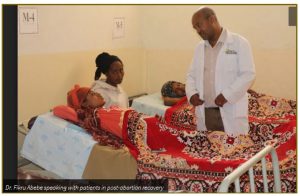
- A medical college in Ethiopia opens a new clinic
On 21 June, a new clinic was opened at Adama Hospital Medical College in Adama, Ethiopia. The hospital and medical college serve a catchment area of more than five million people in the Oromia region, among whom the demand for family planning and abortion services was surging. On average, the clinic sees 100-120 girls and women every day. Teams of nurses and midwives provide contraception, counselling and abortion services. The clinic is a model of integrated sexual reproductive health services, and its impact was immediate. The uptake of safe abortion care, for example, quickly increased by 60%.
- A public meeting in Madagascar discusses abortion law reform
On 1 July, four prominent panellists gave their points of view on the need to decriminalise abortion in Madagascar, including the president of the National Association of Physicians and the president of the Independent National Human Rights Commission. Considering that abortion in Madagascar is a taboo subject, this meeting was a positive step. Panellists highlighted the weight of the church in opposition and talked about abortion as a major public health concern. Although the four panellists had different views on the subject, overall all of them supported the rights of the woman.

- Polish feminists stop debate on yet another anti-abortion bill
On 2 July, Polish feminists managed to prevent the latest repressive abortion bill. The new bill aimed to criminalise abortions on the grounds of fetal impairment, which under the existing narrow law make up 95% of the few legal abortions still carried out in Polish hospitals. After a series of actions throughout the year, a protest by hundreds of activists took place in front of the parliament in Warsaw while the bill was being discussed in committee. Letters were sent from all over the world to members of the Committee, to make them aware of the strong social opposition to it. After half an hour of deliberation, the bill was directed to a sub-committee, which is commonly understood as a “legislative freezer”.

- South Korean advocates and doctors demand law reform
There has been a growing movement for abortion rights in South Korea since last year. In April 2018 the Constitutional Court was due to review the abortion law, in response to a petition circulated by the women’s movement in 2017 which got 230,000 signatures. In the first week of July 2018, a forum took place at the National Assembly building and 5,000 people attended a rally against the current restrictive law. Early in August 2018, the Health Ministry issued regulations which would have enabled medical authorities to suspend the licenses of doctors providing abortions. In protest, on 17 August, nearly 2,500 members of the Korean College of Obstetrics & Gynaecology went on strike. Ten days later, the Health Ministry rescinded the order, but the doctors have demanded a more fundamental solution.
- The Isle of Man successfully reforms their abortion law
On 6 July, the Isle of Man Legislative Council approved their abortion reform bill in full. There were 71 proposed amendments by one Council member, a bishop, which all failed. Under the original law, abortion was only permitted on grounds of rape or mental health concerns; now abortion is permitted on request up to 14 weeks and in some circumstances up to 24 weeks, with the leadership of member of parliament Dr Alex Allinson, who was a key figure throughout the law reform process that took place.
- Amnesty International adopts a new policy on abortion
On 8 July, an Amnesty International members’ meeting in Warsaw, Poland, adopted a new position on safe abortion, which calls on States not just to decriminalise abortion but also to guarantee access to safe and legal abortion in a broad way that fully respects the rights of all people who can get pregnant. In August 2018, Amnesty took up the case of a 15-year-old girl who had been locked up in Indonesia for having an abortion after being raped by her brother. Following international protests, the girl was released on 8 August on humanitarian grounds.
- News site publishes full text of a draft bill to reform abortion law in Côte d’Ivoire
On 9 July, a news source published the text of a draft bill on sexual and reproductive health which would broaden the legal grounds for abortion. Abortion is currently prohibited except to save the life of the pregnant woman. However, the new grounds would include, on the approval of at least three doctors, one of the following grounds: 1. when the continuation of the pregnancy endangers the life and the health of the pregnant woman; 2. at the request of the woman, when the pregnancy is the consequence of a rape or an incestuous relationship; 3. when the fetus has a serious condition or a diagnosed malformation.
- III Abortion & Reproductive Justice: Unfinished Business conference in South Africa
On 8-12 July, Critical Studies in Sexualities and Reproduction, Rhodes University, in conjunction with national and international partners, hosted the Abortion & Reproductive Justice III: Unfinished Business conference in Makhanda, South Africa. This interdisciplinary conference, which received much positive media attention and has led to a surge of action to finally provide more public health services for safe abortion in South Africa, brought together researchers, activists, policy makers, and health professionals from 30 countries to explore and share advocacy, service provision and research lessons and opportunities. Delegates said the conference helped contribute to the vision of unfettered and universal access to safe abortion and reproductive justice. The International Campaign for Women’s Right to Safe Abortion was one of the partners and organised nine hours of participatory discussions for 25 participants on advocacy for decriminalisation of abortion, the role of medical abortion, and overcoming the opposition to safe abortion in Africa.
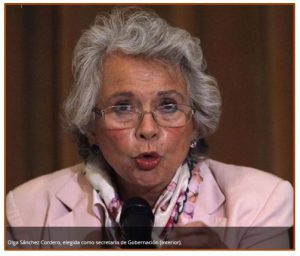
- Newly-elected Mexican government supports abortion law reform
On 12 July, it was announced that the new government-in-waiting of Andrés Manuel López Obrador will seek to decriminalise abortion throughout Mexico after they take office later this year. The future Interior Minister, Olga Sánchez Cordero, explained in a radio interview that she supports abortion up to 12 weeks of pregnancy because she believes that women “should not be deprived of their freedom”. The new government will seek a permanent dialogue with the 32 state congresses on this issue.
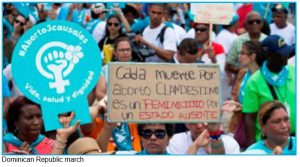
- More than 100 Dominican Republic organisations march for decriminalisation of abortion
On 15 July, thousands of people from more than 100 social and political organisations participated in the “March for Life, Health and Dignity of Dominican Women“. They called for the decriminalisation of abortion on three grounds: when the life of the woman is at risk, in cases of rape or incest, and when the fetus is not viable. Placards carried messages such as: “The rich abort, the poor die”, “The sins according to a religion do not have to be crimes for the nation” and “#Abortion3Grounds: the life, health and dignity of women”. There were also demands that legislators “fulfil their role as representatives of the will of the Dominican people, who have pronounced themselves in favour of the three grounds by a large majority”. The most recent national survey on abortion found that 79% of the population supported decriminalisation of abortion when the life or health of a woman is at risk, 76% when the pregnancy is unviable and 67% in cases of rape or incest.
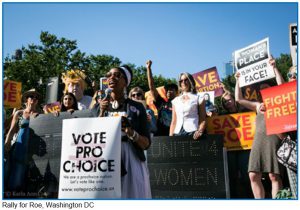
- A USA survey showed strong voter support for the constitutional right to abortion
An online survey conducted by Civis Analytics on 25 July on behalf of Planned Parenthood Action Fund and National Women’s Law Center Action Fund, which included responses from 2,438 likely voters, found that more than 75% of respondents overwhelmingly believe any new Supreme Court justice should uphold women’s constitutional right to abortion. This included 87% of Democrats, 86% of independents, and 54% of Republicans. Strong majorities of voters supported abortion rights across the political spectrum. The majority also believed that the right to have an abortion in the USA is at risk. Hence, votes were twice as likely to support a candidate for elected office who supports women’s rights on abortion, views which will hopefully affect the coming elections in November 2018.

- Brazil Supreme Court holds public hearing on constitutionality of criminalised abortion
On 3 and 6 August, the Brazilian Supreme Court held a public hearing on the constitutionality of a 1940 law that criminalises abortion. The public hearing was convened in the context of a case filed in the court in March 2017, which called for the decriminalisation of abortion on request in the first 12 weeks of pregnancy at the woman’s request. The main argument of the case is that the criminalisation of abortion violates many of women’s constitutional rights, including the right to dignity, the right to citizenship, the right not to be discriminated against, the right to life, equality, freedom, the right to freedom from torture, and the right to health and to family planning. There were 50 presentations heard covering all points of view from health, law and social science experts, feminist and international human rights organisations, and religious representatives. In Brazil, a woman decides to terminate a pregnancy every minute. These are ordinary women, the majority are young, have children, and follow one of the major religions in the country. In the areas of sexuality and reproduction, the Supreme Court has previously ruled on the constitutionality of stem cell research (2008), abortion in the case of anencephaly (2012), and same sex civil unions (2011). In the first two cases, as in this current case, lively public hearings preceded the judgments.
- Developing an Advocacy Agenda for Abortion in the 21st Century and Making Change Happen: An International Forum, 5-6-7 September 2018, Lisbon, Portugal
After more than 18 months in the planning, on 5-8 September 2018, the International Campaign held this forum in Lisbon, Portugal, with some 110 participants from 58 countries. The first day explored the theme of “Medical abortion: reconceptualising access to abortion”. The second day was on “Working towards decriminalisation of abortion”, and the third day was on “National advocacy and strategies for normalising abortion”. Both the presentations in the mornings and the five discussion workshops each afternoon were highly participatory, allowing for the situation in almost all the countries represented to be aired and discussed. The goal of the conference was to develop thought leadership and inspiration, and from the comments received so far from participants, it succeeded. A Campaign advisory meeting took place on the fourth morning, where the future plans of the Campaign were agreed.

FOR 28 SEPTEMBER:
We will report all your activities in the Campaign newsletter and on a 28 September website. PLEASE SEND REPORTS + 1-3 PHOTOGRAPHS TO christina@safeabortionwomensright.org



